|
AGORA - Philosophical Topics Important thinkers on important life-issues |
- Attitudes
- Authenticity
- Death
- Philosophizing
- Friendship
- Beauty
- Happiness
- Inner Freedom
- Inner Truth
- Love
- Meaning
- Music
- Right & Wrong
- Romantic Love
- Sex
- Solitude
An issue for reflection
WHAT IS THE MEANING OF MUSIC?- I have just composed a piece of music.
- Wonderful! What is your music about?
- It’s not about anything. It’s music.
- I mean, what does your music say? What does it tell us?
- But doesn’t it have a meaning? What is the meaning of your piece?
- Well, it has no definite meaning.
- No meaning? So is your music meaningless? An arbitrary sequence of sounds?
- Well… Not arbitrary…
- Your music is not about anything, it doesn’t tell us anything, and it doesn’t have any meaning. So what is it good for?
- No, wait, that’s not how you talk about music!!
- Then how do you talk about music?
- Now you are finally asking a good question.

Music and unity
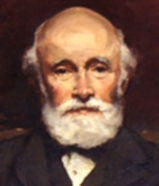 John Sullivan Dwight (1813-1893) was an American thinker, an influential music critic, and a member of the American Transcendentalist movement of the 19th century (which also included Emerson and Thoreau). As a young man he studied at Harvard and was ordained a Unitarian minister, but quickly decided to leave the ministry. He joined the Transcendentalist community at Brook Farm, and later became a music critic. In 1950 Dwight started his own journal of music, which was very successful, and dealt with theoretical and conceptual issues about the nature of music.
John Sullivan Dwight (1813-1893) was an American thinker, an influential music critic, and a member of the American Transcendentalist movement of the 19th century (which also included Emerson and Thoreau). As a young man he studied at Harvard and was ordained a Unitarian minister, but quickly decided to leave the ministry. He joined the Transcendentalist community at Brook Farm, and later became a music critic. In 1950 Dwight started his own journal of music, which was very successful, and dealt with theoretical and conceptual issues about the nature of music.The following text is adapted from Dwight’s essay “Music,” published in 1849 by his friend Elizabeth Peabody in a collection of articles on art, “Aesthetic Papers.” Here he describes music in the Transcendentalist spirit, as a universal languages through which we communicate with the deepest dimension of the reality, the unity of life and the universe. (Compare to Emerson’s “Over-soul”)
No other communion is as intimate as that which operates through music. Intimate – and yet most mystical. It is an intimacy that is not profaned by an external sense of familiarity, but is a meeting and communing with the ideal which never grows familiar. Why is this so, if not because the sentiment always tends towards unity, while thought always differentiates and splits?
[…]
The native impulses of the soul – or what we call the passions, or affections, propensities, desires – are, all of them, when considered in their essence and original undistorted tendency, divinely implanted loves. Union, harmony of some sort, is their very life. To meet, to unite, to blend by methods complex and quick, is their whole business and effort through eternity. They are attracted to what must also be their destiny: not to collision, not to excess followed by exhaustion, not discord, chaos, and confusion; but to binding ties of agreement and connectedness through all spheres, from the simplest to the most universal accords. Through these (how else?) the hearts of the human race would be woven into one mutually conscious, undivided whole, one living temple not too narrow, nor too fragmentary for receiving the Spirit of Good.
Isn’t this announced in music, the natural language of these passions, which cannot express corruption nor any evil feeling, without ceasing to be music; which has no tone for any bad passion, and whatever it expresses translates into harmony and beauty? The blending of all these passions harmoniously into one becomes man’s central love, the deepest and most undivided life. This is the love of God […] to whom the soul seeks its way, by instinct however blind, through all these partial harmonies, learning by degrees to understand the universal nature of its desire and aim.
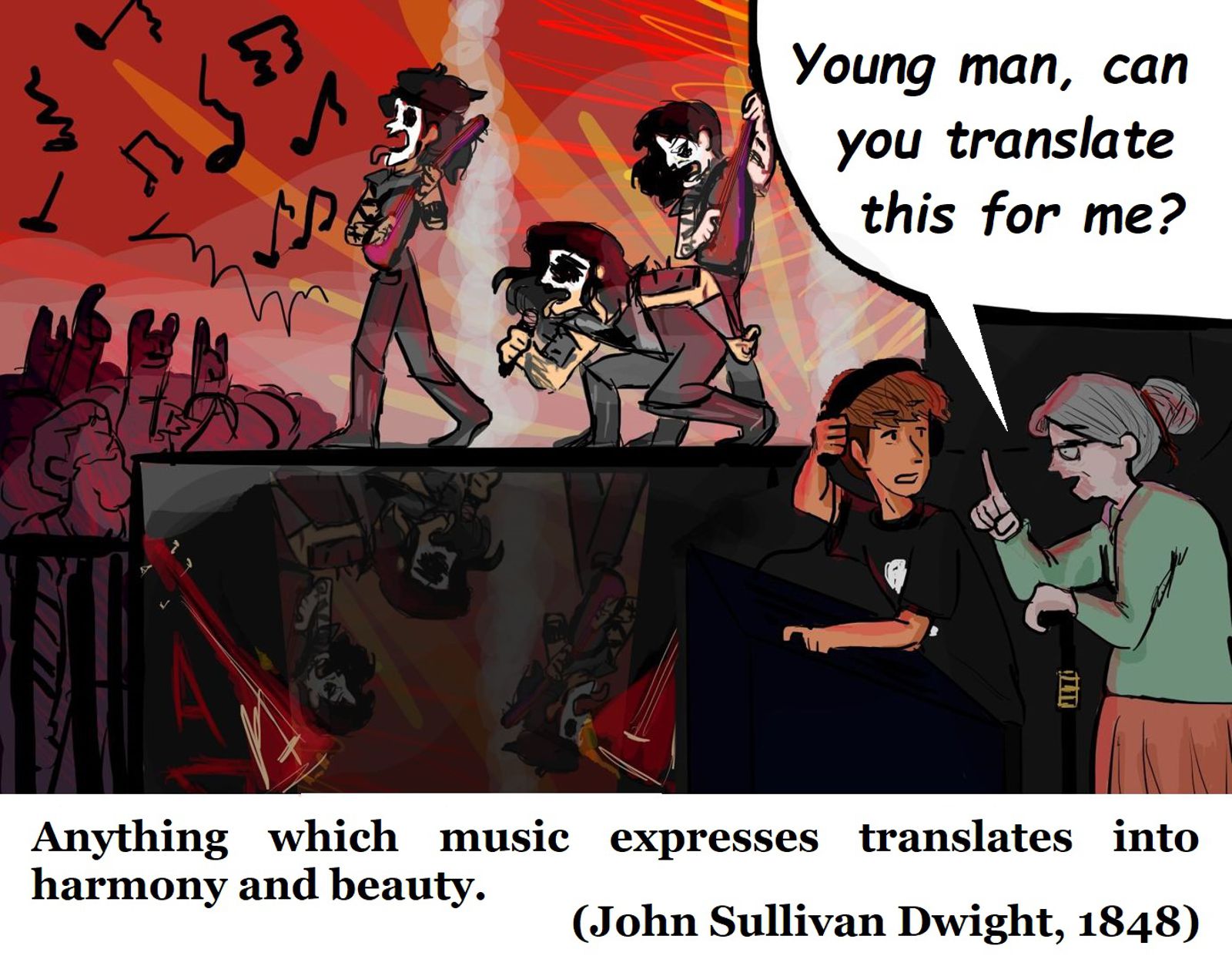
The sentiment of unity, the strongest and deepest sentiment of which a man is capable, the great affection into which all man’s affections flow — to find themselves, not lose themselves. When little desires conflict, it looks to the source, and immediately they are reconciled in passion for the glory of the whole. It lifts a person above the thought of self, by making him in every sense fully himself, by reuniting his prism-like multi-colored passions into one which is as clear and universal as the light. It is the sentiment which seeks only universal harmony and order, so that all things, whether of the inner or of the outer world, may be perfectly transparent to the love that is essential to them, and so that the only condition of peace and happiness, the consciousness of one in all and all in one, may never more be incomplete. That is what the common sense of humankind means by the religious sentiment — that is the pure essence of religion.
Music is the natural language of this sentiment, the main celebration of its worship, a celebration that cannot lose its sacredness. Because music cannot cease to be harmony, cannot cease to symbolize the sacred relationship of each one to all, cannot contract a stain, any more than the sunbeam which shines into all corners. Music cannot narrow or hide the message which it carries; it cannot lie. It cannot raise questions in the mind, or excite anything except pure enthusiasm. It is God's alphabet, and not man's, unalterable and incorruptible, suited for the harmony of the human passions and affections. It is sent to us, in the long winter of disharmony and conflict, to be a perpetual prototype and monitor, rather than a preview, of that harmony which must yet come.
The Realness of Music
 Arthur Schopenhauer (1788-1860) was an influential German philosopher, known for his pessimism. He studied with Fichte, Schleiermacher and others at the University of Gottingen. After becoming a lecturer at the University of Berlin, he scheduled his lectures at the same time as the lectures of the famous philosopher Hegel (whom he did not respect). And while Hegel’s lecture-halls were full, only five students came to hear Schopenhauer. Disappointed, he left the academic world. He lived alone, never married, and died at home from respiratory failure. Although he was not well-known during his life-time, after his death his writings influenced many important thinkers and artists, such as Wagner, Nietzsche, and Freud.
Arthur Schopenhauer (1788-1860) was an influential German philosopher, known for his pessimism. He studied with Fichte, Schleiermacher and others at the University of Gottingen. After becoming a lecturer at the University of Berlin, he scheduled his lectures at the same time as the lectures of the famous philosopher Hegel (whom he did not respect). And while Hegel’s lecture-halls were full, only five students came to hear Schopenhauer. Disappointed, he left the academic world. He lived alone, never married, and died at home from respiratory failure. Although he was not well-known during his life-time, after his death his writings influenced many important thinkers and artists, such as Wagner, Nietzsche, and Freud. Schopenhauer’s main philosophy book, The World as Will and Representation (1818), describes our world as an expression of the Will. The Will is the foundation of reality, the essence of everything, a metaphysical power that is blind, arbitrary, always hungry for more, without purpose or law. The personal will of an individual person is a small fragment of this metaphysical Will, and it drives us and motivates us in its arbitrary ways. Everything we find in our world is an “objectification” (manifestation, expression) of the Will: The Will “objectifies” (manifests) itself as trees, animals, earthquakes, wars, people, etc.
Thus, the essence of reality – the Will – is hidden from us, yet it reveals itself in one way: through music. Music is the window to reality itself. No wonder that music can touch us so deeply! This is because music is abstract and does not contain ideas, so the Will expresses itself through music directly. In contrast, other arts like literature or painting, describe reality (the Will) indirectly, through Ideas – the idea of woman (the Mona Lisa), the idea of war (War and Peace), etc. Music is therefore unique among all arts, because it is the only one that is completely abstracted from things, and thus the only one that expresses reality (the Will) directly. (This applies only to abstract music, not to figurative or emotional music.)
The following passage is adapted from that book, Part 3, Section 52. Here Schopenhauer explains why music is a direct manifestation – or “objectification” – of the Will.
Music stands apart from all the other arts. In music we do not find the copy, or repetition, of the ideas of the inner nature of the world. Yet, it is such a great and remarkably fine art, and its effect on man’s innermost nature is so powerful, and man understands it so completely and profoundly in his innermost being as an entirely universal language, that it is clearer than even the world of perception […]
All of the arts objectify the Will only indirectly, in other words, through the Ideas. Our world is only Ideas appearing through the plurality of things, […] and therefore music, since it passes over the Ideas, is also independent of the phenomenal world; it ignores it, and, to a certain extent, it could still exist even if there was no world at all (which is not the case with the other arts).
Thus, music is an IMMEDIATE objectification and copy of the whole Will, just as the world itself, which is a multiplicity that consists of individual things, is an objectification of the Will. Therefore, music is by no means like the other arts, namely a copy of the Ideas, but rather a copy of the Will itself. For this reason, the effect of music is much more powerful and penetrating than the effect of the other arts, because these arts speak only of the shadow, but music speaks of the essence.
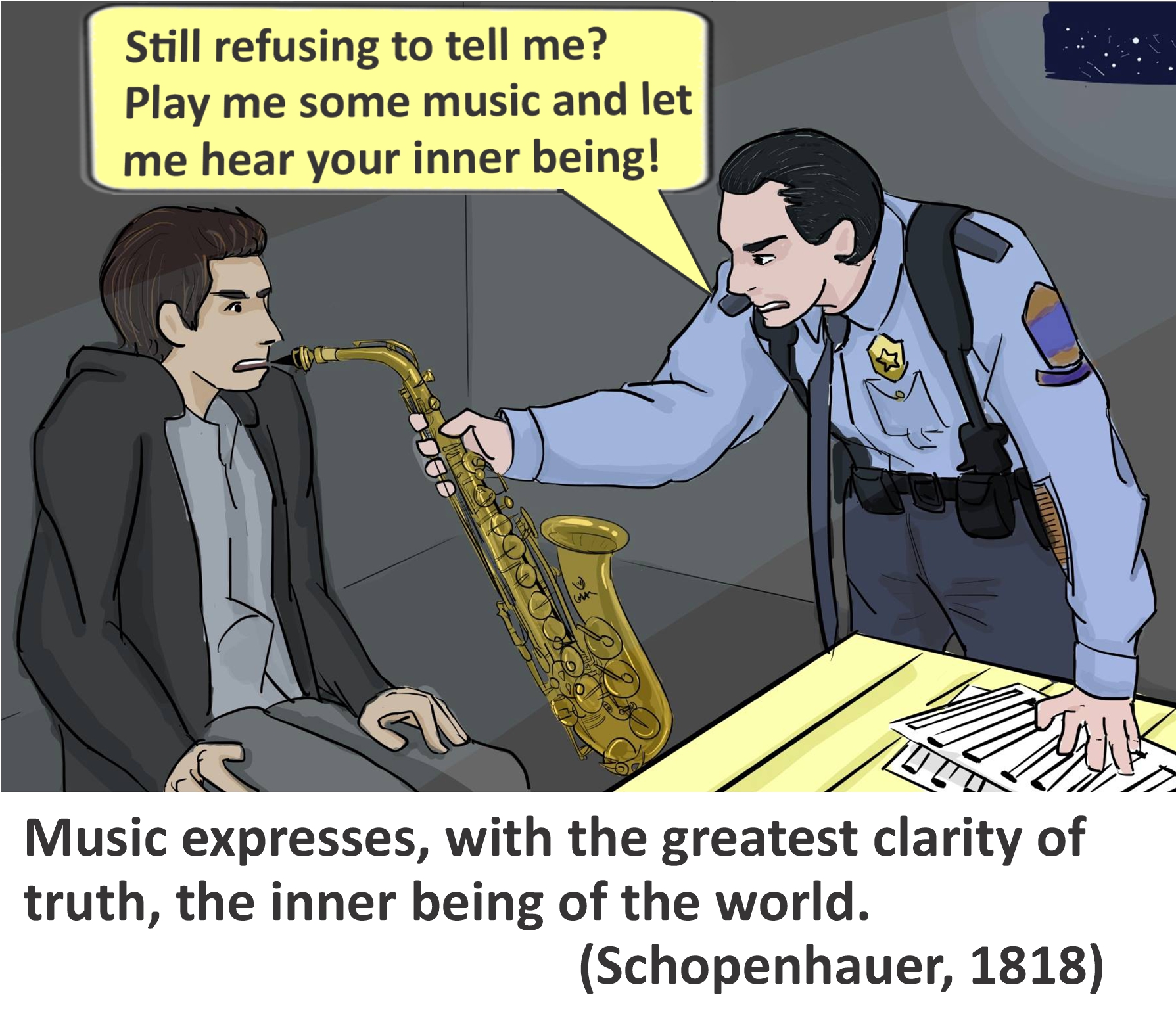
[…]
The composer’s invention of melody, which reveals all the deepest secrets of human willing and feeling, is the work of the composer’s genius, whose effect is more apparent in music than anywhere else. This genius is far removed from all [intellectual] thoughts and conscious intentions, and might be called an inspiration. Here, as everywhere in art, the [intellectual] concept is not productive. The composer reveals the innermost nature of the world, and expresses the profoundest wisdom in a language that his reasoning faculty does not understand, just as a hypnotized person gives information about things of which he has no idea when he is awake. Therefore, in the composer, more than in any other artist, the man is entirely separate from the artist. […]
[…] Music never expresses the phenomenon, but only the inner nature (the in-itself) of every phenomenon, which is the Will itself. Therefore, music does not express this or that particular pleasure, this or that misery, pain, sorrow, horror, joy, happiness or peace of mind. It expresses joy, pain, sorrow, horror, happiness, peace of mind THEMSELVES – to a certain extent in the abstract, in their essential nature, without anything additional, and so also without what motivates them. Nevertheless, we understand them perfectly in this essence. […] Everywhere music expresses only the essence of life and its events, never these events themselves, and therefore their specific variations do not always influence it. This universality, which belongs uniquely to music, together with music’s most precise distinctness, gives music that high value as the panacea [=universal cure] of all our sorrows. […]
The inexpressible depth of all music, because of which it floats past us like a paradise quite familiar and yet eternally remote, and is so easy to understand and yet so inexplicable, is due to the fact that music reproduces all the emotions of our innermost being – but entirely without reality and remote from reality’s pain. In the same way, the seriousness that is essential to music, which excludes everything ridiculous from its special province, is to be explained by the fact that the object of music is not the representation [of the world] – where deception and ridiculousness are possible; rather, the object of music is directly the Will. And this is essentially the most serious of all things, since everything depends on it. […]
In the whole of this discussion on music I tried to make it clear that music expresses in an exceedingly universal language, through the homogeneous material of mere tones, and with the greatest clarity of truth – the inner being, the in-itself of the world, which is the Will, according to its most distinct manifestation.
LEOPARDI
Music isn’t about beauty
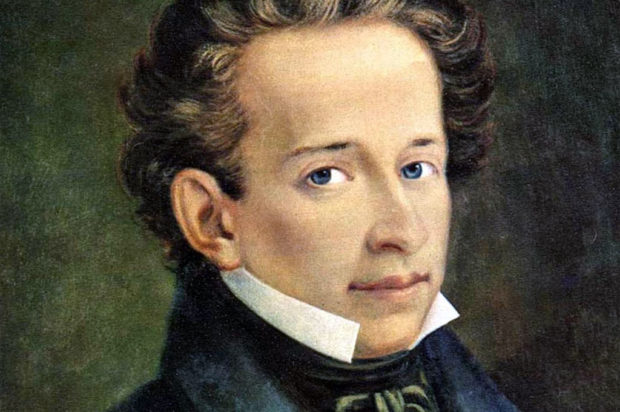 Giacomo Leopardi (1798-1837) was an Italian thinker, and a major Italian poet. He was born to a local noble family and received private education. When he moved to Rome in his twenties, he was deeply disappointed by the hypocrisy and corruption, and although he later moved to other cities, his critical and pessimistic attitude continued for the rest of his life. In his philosophical writings and personal journals he wrote about the human condition, often pessimistically. His poetry was Romantic. His health was weak for most of his life, and he died of heart failure at the age of 39.
Giacomo Leopardi (1798-1837) was an Italian thinker, and a major Italian poet. He was born to a local noble family and received private education. When he moved to Rome in his twenties, he was deeply disappointed by the hypocrisy and corruption, and although he later moved to other cities, his critical and pessimistic attitude continued for the rest of his life. In his philosophical writings and personal journals he wrote about the human condition, often pessimistically. His poetry was Romantic. His health was weak for most of his life, and he died of heart failure at the age of 39. The following is adapted from his book THOUGHTS (Pensieri, 1837), a large collection of fragments about humanity, which are often pessimistic and critical. In the passages below Leopardi argues that the pleasure we get from music does not come from sophisticated laws of musical composition (or what he calls “theory of beauty” or “correctness”), but only from two simple facts: First, from the fact that listeners are used to this kind of music. Second, from the qualities of the performer’s voice (or sound). In short, enjoyable music is nothing but sequences of sounds which you are accustomed to, produced by a beautiful voice. This view seems in line with Leopardi’s low opinion of humanity and life.
[Passages 3208-9]
What constitutes melody in music is that the sequence of harmonies of tones is determined by habituation, or by arbitrary laws [invented by professionals]. This can be seen in the fact that musical melodies do not delight those who have no professional knowledge, unless the sequence of tones in them is such that our ears are used to them […]. The music of Rossini is universally appreciated only because his melodies are either entirely popular, and are lifted (so to speak) from the mouths of the people, or they resemble those sequences of tones which people are familiar with, and have become accustomed to them.
[Passages 3422-3425]
We can see that the miracle of music, the force which it naturally has on our emotions, the pleasure which it naturally gives us, its power to arouse enthusiasm and imagination, etc., is based on sound and voice […] when they are combined in a way that is naturally pleasing to the ear. We can also see that this is not a matter of melody. And we can see that consequently the main point of music, and of its effects, do not strictly speaking belong to the theory of beautiful composition […]. We realize all this from the fact that there is no melody that is so poor that it cannot give immense pleasure when performed perfectly by a pleasing instrument or voice. And conversely, there is no melody that is so beautiful that it can provide any delight at all when performed with an unattractive instrument or voice, for example with sticks on a piece of wood, or on several pieces of wood corresponding to the various tones.
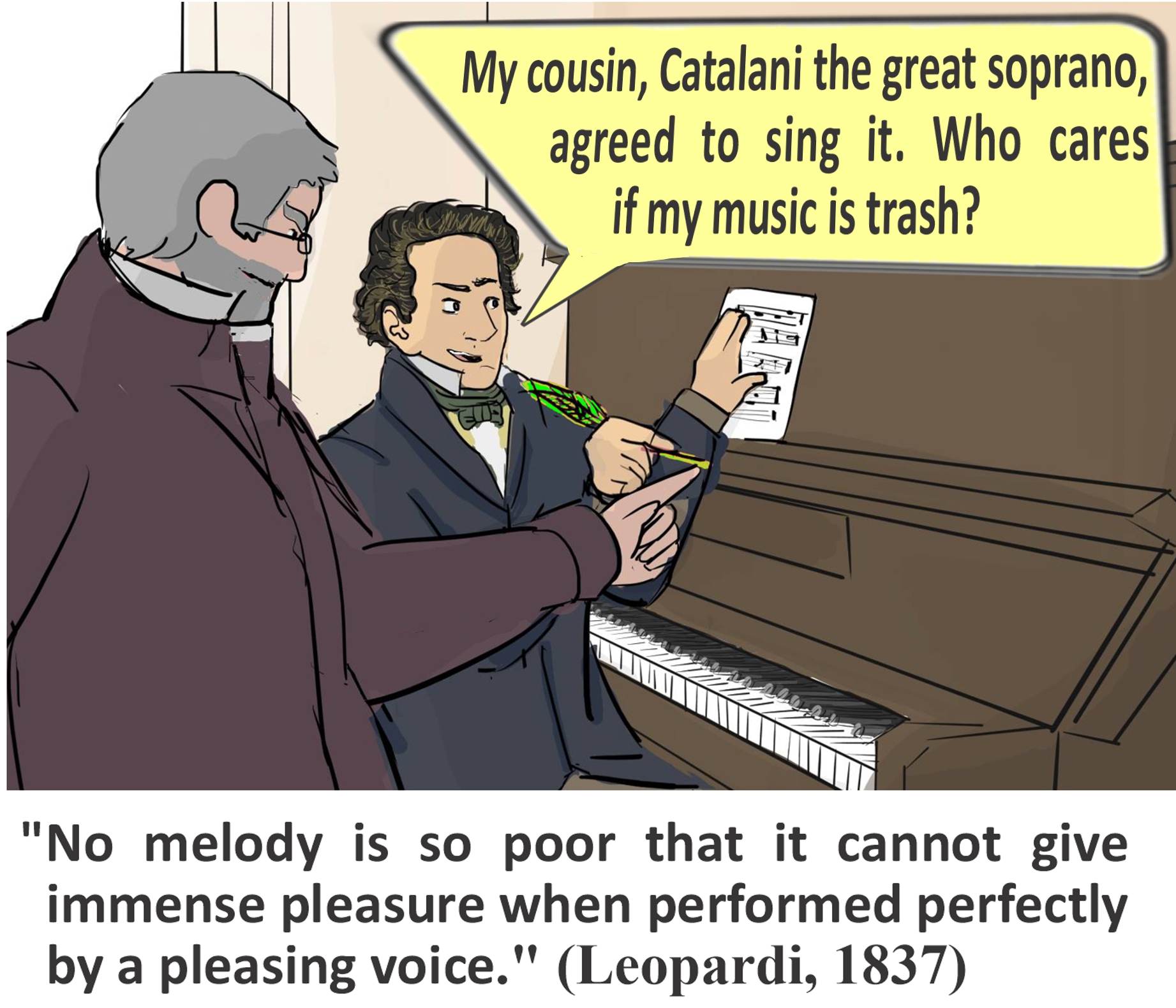
Recently people had the opportunity to notice these truths when, according to reports, the astonishing voice of the singer Angelica Catalani has almost recreated the miraculous effects of ancient music in her listeners. Such effects certainly did not derive mainly or even partly from the melodies. These melodies, besides the fact that they could have been sung by a thousand other singers, are well-known to be most trivial and dull. All the delight, therefore, originated from the voice of the singer, that is, from the voice’s qualities that are naturally pleasing to the human ear: extraordinary sweetness, flexibility, speed, range, etc., a singing voice that is resonant, clear, pure, penetrating, oscillating, tinkling, like strings of some other musical instruments, etc., etc. All these qualities are independent of musical correctness [=the rules of composition].
[…] It is not the melodies themselves or their novelty that produce this delight. It is the instruments, the voices, which are so refined and perfected […]. When the perfect quality of these organs is combined with the art of using them perfectly – that is, producing the most pleasing sounds from them as somebody without any art could not do, and when this is also combined with the art of harmonizing these organs together in a way that is naturally most pleasing to the ear (like the art of mixing flavors), the result is a sweetness […] which produces supreme pleasure and marvelous effect. Such pleasure and effects have nothing whatsoever to do with beauty [=beautiful composition], because they have nothing to do with correctness. […]
In view of these observations we can explain effectively, and better than any other way, many of the miracles of ancient music, especially those told about nations in the most unsophisticated times, such as Biblical Saul and David, etc. These miracles did not spring from the qualities of the melodies, as is commonly believed, but from the natural or artificial qualities of the instruments or voices, and the methods of playing or using them, because such qualities gave rise to sounds, or harmonies of sounds, that were extraordinarily pleasing to the ear in their own right – extraordinarily, I mean, for those nations and times.
- Authenticity